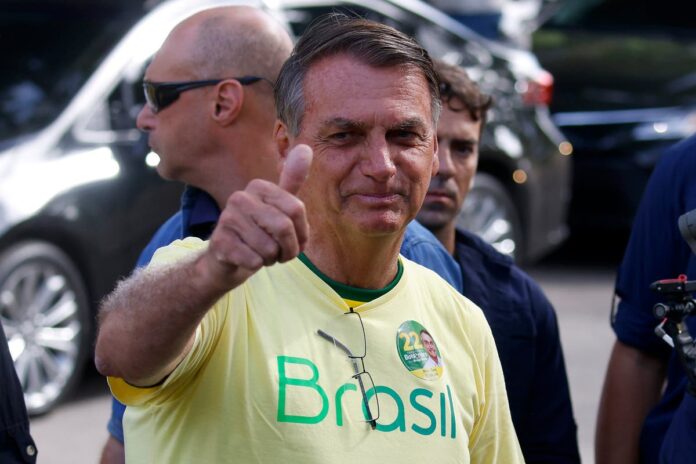Brazil is going through the most important presidential election in its history. On 30 October, voters will decide who will be the president of the country with the largest population in South America and the fourth largest democracy in the world. Voters will also determine the success or failure of a new global movement of the populist extreme right that has in the current president, Jair Bolsonaro, its national leader, and in the ex-US president, Donald Trump, its best-known exponent worldwide.The political phenomenon that Bolsonaro and Trump embody has a fundamental characteristic: using the democratic process and then weakening it so that it becomes unrecognisable and incapable of containing its presidents’ authoritarian excesses. Both Trump and Bolsonaro were elected by popular vote. The two ruled in similar ways: inciting a radicalised base, praising the use of firearms, spreading fake news and political disinformation, creating conspiracy theories, and treating their political opponents as enemies rather than legitimate adversaries. Both have attacked the free press of their respective countries and leveled frivolous and unfounded accusations against their electoral systems and judicial control bodies.Trump failed in his coup attempt, which culminated in the invasion for US Capitol on 6 January 2021. Now, Bolsonaro is trying to succeed where his political mentor has failed. The script is familiar: he will say he won the election, even if he loses. Then he will do everything to disrupt vote counting, raising unfounded suspicions and maliciously spreading baseless rumors. The United States was lucky that its military did not give in to Trump’s pressure to carry out a coup. But in Brazil, Bolsonaro has co-opted active duty and retired generals who participated in his government and now openly campaign for him. In addition, he has asked the armed forces as an institution to carry out a ‘parallel vote count,’ even though this function has never been delegated to the military in the history of Brazilian elections.Bolsonaro is unlikely to win, but his victory is not impossible. In the first round, held on 2 October, he finished in second place, with just over 51 million votes, which represented 43.2 per cent of voters. The first-round winner, with 57 million votes (48.4 per cent) was Luiz Inácio Lula da Silva, a popular leader of working-class origins, who built his political career in the trade union movement and governed Brazil for two consecutive terms from 2003 to 2011. The difference between them was 5 percentage points, or 6 million votes. No Brazilian research institute projects a second-round Bolsonaro victory, but the Brazilian president publicly says he will win. If he doesn’t, he will likely claim the electronic voting machines were rigged.It is not surprising that, despite his attacks on democracy, Bolsonaro has such an expressive vote. That’s not news. Trump is there to demonstrate that undemocratic politicians can enjoy broad popular support. These new populist and authoritarian leaders benefit from the freedoms granted by democracy to attack the system that elected them. Once in power, they control the budget, distribute political favours with public money, and make use of their base in Congress to attack checks and balances. The preferred target is the judiciary. In Brazil, allies of President Bolsonaro, such as his vice president and now an elected senator, Jose Hamilton Mourão, are already giving television interviews saying that in a new term, Bolsonarism intends to change the retirement rules of current Supreme Court members and increase the number of vacancies in order to appoint allied judges and dilute resistance to the Executive’s acts.To keep up to speed with all the latest opinions and comment, sign up to our free weekly Voices Dispatches newsletter by clicking hereBut the damage doesn’t just happen when these leaders are elected. In Brazil, as in the United States, an extreme right that was defeated at the polls still has enormous power to mobilise. The false accusations of electoral fraud, the use of social networks, and the exaltation of firearms has created political violence, which destabilise society and threaten the governability of the winning camp.In the first round, Bolsonarism elected a wave of congressional representatives and senators from the extreme right, in addition to allied governors in several states. Even without a mandate, Bolsonaro will continue as the leader of a broad sector of the population, hovering as a destabilising political figure, just as Trump maintains influence as the head of the Republican Party. It is possible that Brazilian institutions do not have the same resilience as do American institutions to seek accountability for those responsible for attacks on the electoral system and democracy.The outcome of the Brazilian election is worrying. If Bolsonaro wins, he will ignore checks and balances to threaten democracy, human rights and the environment in a much more radical and unimpeded way than during his first term. If he loses the election, like Trump, he will attempt to destabilise his rival’s government, increasing the risks of violent confrontations and political and social unrest that far transcend Brazil itself.James N. Green is professor of Brazilian history at Brown University and the president of the board of directors of the Washington Brazil Office


